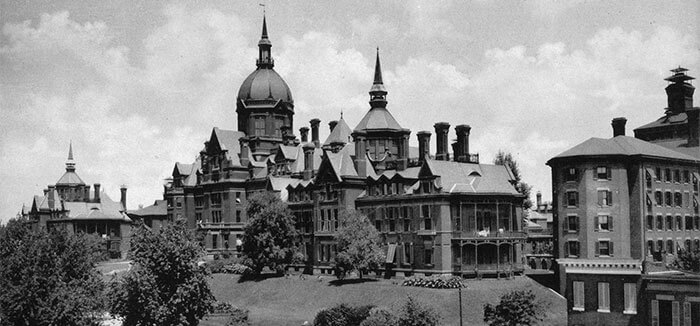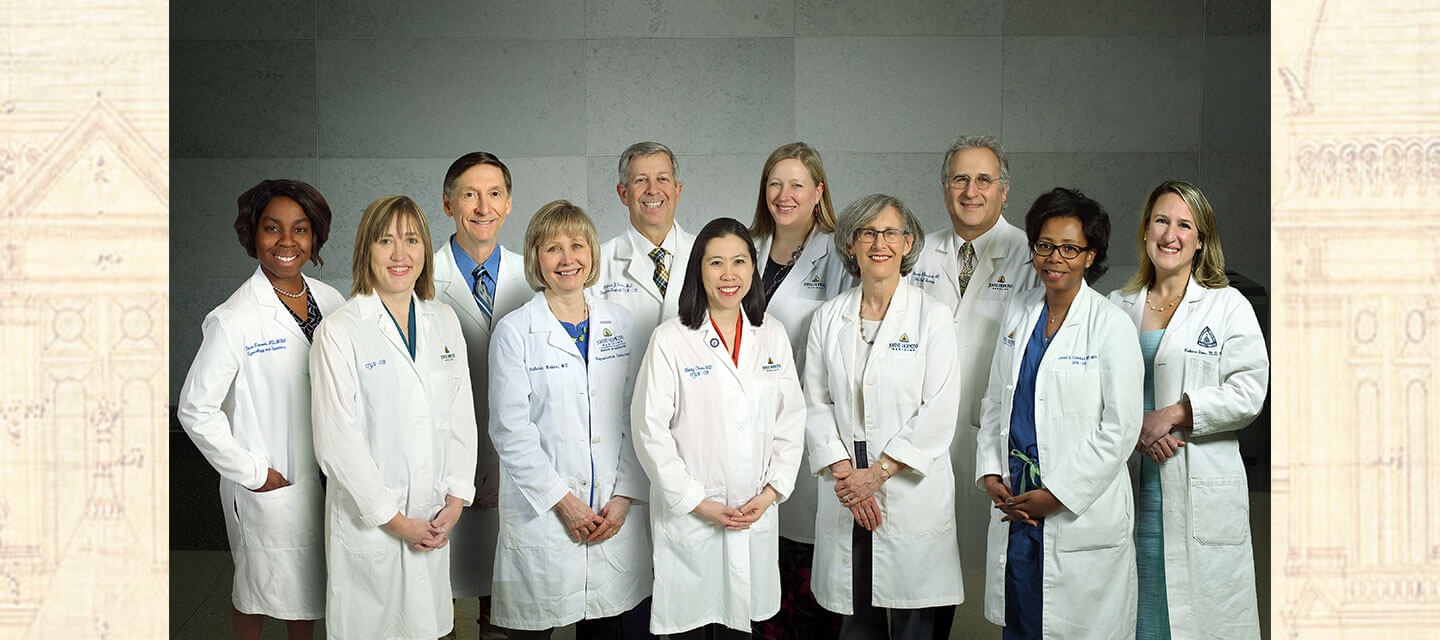
The history of the department of Gynecology and Obstetrics can be traced back to the founding of Johns Hopkins Hospital. We are proud to honor the contributions of our departments' physicians and researchers as they helped to change the face of obstetrics and gynecology in the United States - from their academic study to their impact on women and their babies.
The Department of Gynecology and Obstetrics Historical Timeline
-
1889 (Location): Howard Atwood Kelly Founds the Johns Hopkins Hospital & Department of Gynecology

Howard Atwood Kelly was the youngest of the four founders of Johns Hopkins, which included William Halstead, William Osler and William Welch. In October 1889, Kelly was appointed the first professor of gynecology and obstetrics, and is universally regarded as establishing gynecology as a surgical specialty. He was a pioneer, creating many innovative techniques, including the Kelly clamps and the Kelly stitch. Kelly’s skill as a surgeon, his detailed publications and his originality contributed to his reputation as one of the greatest gynecologists of his time. The Department of Gynecology and Obstetrics continues to honor Kelly’s legacy through its Kelly Alumni Society, Kelly Gynecologic Oncology Service and annual Kelly Lecture.
-
1899 (Milestone): John Whitridge Williams Becomes the First Director of Obstetrics

With the establishment of the School of Medicine in the 1890's, it was clear that maternity services education in this area would be a requirement to attain academic credibility. In 1899 John Whitridge Williams became the first professor and director of the newly established Department of Obstetrics. Williams has since come to be regarded as the founder of academic obstetrics in the United States. One of his lasting legacies is the Williams Obstetrics textbook, considered a classic of the obstetrical field, as it represented the first obstetric textbook with a scientific foundation.
-
1922 (Research): Dorothy Edwards Impact as the First Endowed Chair for the Department
Dorothy Edwards studied at the Johns Hopkins University School of Medicine from 1917 — two years before American women won the right to vote — until 1922. At a time when it was very unusual for a woman to pursue higher education, she attended some of the best schools in the world, including Northwestern, Cornell, and universities in Vienna and Edinburgh. She went on to become a successful gynecologist in Chicago. With her continued foresight, Edwards made a bequest to support the creation of an endowed professorship in the Department of Gynecology and Obstetrics — the first endowed chair for the department. Johns Hopkins University remains grateful to Edwards for her vision. Her legacy continues today through the Dr. Dorothy Edwards Professorship, a position held by the director of the Department of Gynecology and Obstetrics.
-
1939 (Milestone): Richard TeLinde Becomes Director of the Department of Gynecology
Richard Wesley TeLinde trained in general surgery and gynecology, a unique distinction that led to significant changes during his 21 years as director of the Department of Gynecology, which began in 1939. TeLinde helped to increase the relationship between the obstetrics and gynecology departments during his tenure. He has also garnered a place in gynecologic history with his text TeLinde’s Operative Gynecology, which continues to be a resource for residents and practicing physicians. Due to TeLinde’s belief that an understanding of gynecologic pathology was essential to the training of gynecologists and gynecologic residents, he endowed a chair focused on gynecologic pathology. His bequest enabled the establishment of the Richard W. TeLinde Distinguished Professor, a position held by the lead gynecologic pathologist in the Department of Gynecology and Obstetrics. TeLinde’s legacy is additionally honored through the Richard W. TeLinde and Edward E. Wallach Professorship in Reproductive Endocrinology, a chair endowed through a gift by Howard W. Jones Jr., M.D., and his family to honor TeLinde’s mentorship of Drs. Howard and Georgeanna Jones.
-
1935 (Research): Nicholson Eastman's Contributions as Obstetrician-in-Chief
Nicholson J. Eastman, appointed to the position of obstetrician-in-chief in 1935, was well-known for his immense skill in research. Throughout his tenure, he was actively involved in basic research related to the well-being of mothers and their babies. He further cemented his status as an important figure in the obstetrical field with the Obstetrical and Gynecological Survey journal. He held the role of obstetrical editor for this publication from 1946 to 1967. His numerous publications also represent the first efforts to scientifically delineate what is now recognized as maternal-fetal medicine. The Nicholson J. Eastman Endowed Lectureship was established by his family, friends and colleagues to recognize and honor his contributions and dedication to Johns Hopkins Medicine and the field of gynecology and obstetrics.
-
1960 (Milestone): Allan Barnes is First Joint Director of Gynecology and Obstetrics

In 1960, Allan Barnes was appointed as the first joint director and professor of the Department of Gynecology and Obstetrics. This represented a significant change for the Johns Hopkins University School of Medicine, as the two departments had always intentionally remained separate. Barnes had a vision of changing obstetrics and gynecology into a scientifically oriented discipline and sought to expand basic research initiatives in both areas. He encouraged faculty members and residents to begin research in fetal immunology, endocrinology, in vitro fertilization, laparoscopy and more. Barnes was also known as a humanist with a strong sense of social responsibility during a time of great upheaval in the United States.
-
1952-1989 (Document): James Woodruff Directs the Division of Gynecologic Pathology
James Donald Woodruff directed the Division of Gynecologic Pathology from 1952 to 1989, marking an academic career that excelled in patient care, teaching and research. His work appears in over 250 publications and covers a variety of topics, including ovarian tumors, vulvar disease and carcinoma of the genital tract. Woodruff was known as a beloved teacher of Gyn/Ob residents and as the father of gynecologic pathology as an academic medical discipline. With the help of Woodruff’s friends and colleagues, Johns Hopkins University recognized his many achievements by naming a professorship, lecture hall and annual teaching award in his honor.
-
1947-1978 (Milestone): The Impact of Howard Jones Jr. and Georgeanna Seegar Jones
Howard Jones Jr. and Georgeanna Seegar Jones were professors in the Department of Gynecology and Obstetrics from 1947 until their retirement in 1978. During his tenure, Howard Jones was known for being a masterful surgeon whose residency training in general surgery and gynecology provided him with unique experience. Georgeanna Jones rose to prominence as the first full-time gynecologic endocrinologist on a medical school faculty in the United States. The couple also worked together as a team in their infertility studies. After retiring in 1978, they joined Eastern Virginia Medical School to develop an in vitro fertilization (IVF) program. They were ultimately successful, with their program yielding the first baby born from IVF in the United States. Through the philanthropic support of Jones and Seegar Jones’ family, friends and colleagues, Johns Hopkins University established the Howard W. Jones Jr., M.D., and Georgeanna Seegar Jones, M.D., Lectureship to honor their many achievements. Their legacy is additionally honored through the Howard W. Jones Jr., M.D., and Georgeanna Seegar Jones, M.D., Professorship, a chair endowed through a gift by Lonnie and Betty Burnett to honor their lifelong friendship with the Joneses.
-
1984 (Research): Edward Wallach's Effect on Reproductive Endocrinology
Edward Wallach became the director of the Department of Gynecology and Obstetrics in 1984, a unique juncture in the discipline. Significant changes were occurring in the field, with demographics greatly changing as faculty members went from predominantly male to more than 30 percent female, and with an increased focus on subspecializations, including reproductive endocrinology, perinatology and gynecologic oncology. While Wallach valued this focus on subspecialization, he also stressed the continued importance of residents learning the core of general obstetrics and gynecology. The Edward E. Wallach Fellowship in Reproductive Endocrinology and Infertility was established by his family, friends and colleagues to recognize and honor his contributions and dedication to Johns Hopkins Medicine and the field of gynecology and obstetrics through supporting the training of the next generation of women’s health specialists. Wallach’s legacy is additionally honored through the Richard W. TeLinde and Edward E. Wallach Professorship in Reproductive Endocrinology, a chair endowed through a gift by Howard W. Jones Jr., M.D., and his family to honor Wallach’s relationship with Jones.
-
1988 (Milestone): Jennifer Niebyl Advances Maternal Fetal Medicine
Jennifer Niebyl served as the director of the Division of Maternal-Fetal Medicine in the Department of Gynecology and Obstetrics at Johns Hopkins from 1982 to 1988. In 1988, she became the third woman to head a department of obstetrics and gynecology in the United States when she was named professor and chair of the Department of Obstetrics and Gynecology at the University of Iowa Carver College of Medicine, a position she held for 21 years. Niebyl was inspired to become a doctor so she could be involved in “the decision-making process for the health care of women.” In a time when few women were in the field of obstetrics, Niebyl built an influential career, focusing on known problems affecting the developing fetus and on lesser-known concerns, such as the impact of morning sickness. Johns Hopkins is grateful to Niebyl for her leadership in women’s health and visionary philanthropy through her bequest to establish the first endowed professorship in the Division of Maternal-Fetal Medicine at Johns Hopkins.
-
1996 - 2013 (Research): Harold Fox Brings Stem Cell Research and Major Safety Changes to Hopkins
Harold Fox joined the faculty at the Johns Hopkins University School of Medicine in 1996 and served as the Dr. Dorothy Edwards Professor of Gynecology and Obstetrics until 2013. During his tenure, he facilitated the development of the stem cell research programs and advanced fellowships in gynecologic oncology and urogynecology. In addition, Fox developed and chaired major programs in obstetrical safety during his time at Johns Hopkins and other major academic institutions. With the philanthropic support of Fox, his colleagues and friends, the Harold E. Fox, M.D., Division of Education continues his legacy through the training and education of the next generation of obstetricians and gynecologists.
-
2013 - present (Milestone): Director Andy Satin Leads Department Into the Future

The traditions established by Kelly and Williams over 100 years ago were carried throughout the 20th century and continue at Johns Hopkins today. Presently led by Andrew Satin, the Department has experienced unprecedented investment and growth in all three arms of the tripartite mission while advocating for women's health issues. The Department was a national leader in the response to the COVID-19 pandemic. The distinguished faculty of The Johns Hopkins Department of Gynecology and Obstetrics represents a team of highly trained experts advancing the field through remarkable patient care, trailblazing research and comprehensive training of the next generation of women’s health leaders.

Our faculty’s research endeavors will focus on these areas in the coming years:
- Gynecologic cancers
- Benign gynecologic conditions including endometriosis, infertility, fibroids, reproductive medicine and immunology
- Fetal medicine
- Critical care obstetrics
- Utilizing the Precision Medicine Analytics Platform Ob Registry to address disparities in outcomes
- Developing physician scientists through our WRHR, BIRCWH, and RSDP programs
- Developing advanced and innovative fetal surgery techniques
- Preserving female fertility after cancer treatment
- Identifying the genes that cause infertility
- Improving methodologies for early detection of gynecologic cancers
- Researching the etiology, prevention and treatment of pelvic floor disorders
- Providing reproductive health care for women with HIV
- Genetically engineering a vaccine to ultimately eradicate precancerous cervical lesions